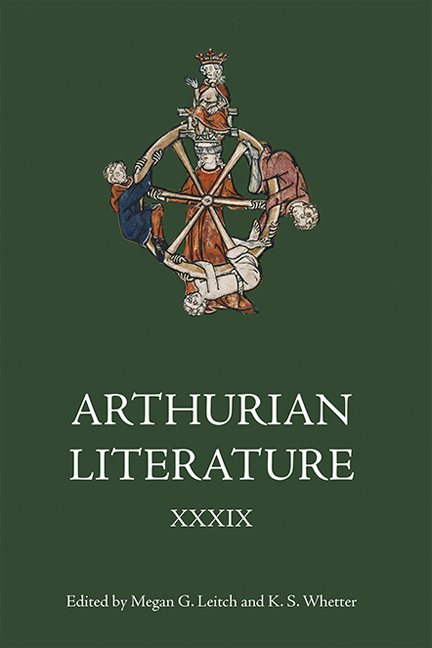Book contents
- Frontmatter
- Contents
- General Editors’ Preface
- List of Contributors
- List of Abbreviations
- 1 The Derek Brewer Essay Prize: Playing Arthur: Making the Elizabethan Mariner
- 2 Ignoring Arthur: Patterns of (In)Attention in Manuscripts of Latin Histories
- 3 ‘Þe place þat ȝe prece to ful perelous is halden’: The Evil Custom in Sir Gawain and the Green Knight
- 4 ‘aske bettyr, I counseyle the’: Requests, Conditions, and Consent in Malory’s ‘Sir Gareth of Orkney’
- 5 Supernatural Transformation in Malory’s Le Morte Darthur
- 6 Personal Piety and ‘semyng outeward’: Self and Identity in Thomas Malory’s ‘Tale of the Sankgreal’
- 7 Evil Will and Shameful Death: Revisiting Law in Malory’s Morte Darthur
- 8 The Return of the Return of Mordred
- In Praise of Elizabeth: Beyond the Books
- Announcement and Details of the Derek Brewer Prize
- Contents of Recent Previous Volumes@
In Praise of Elizabeth: Beyond the Books
Published online by Cambridge University Press: 08 May 2024
- Frontmatter
- Contents
- General Editors’ Preface
- List of Contributors
- List of Abbreviations
- 1 The Derek Brewer Essay Prize: Playing Arthur: Making the Elizabethan Mariner
- 2 Ignoring Arthur: Patterns of (In)Attention in Manuscripts of Latin Histories
- 3 ‘Þe place þat ȝe prece to ful perelous is halden’: The Evil Custom in Sir Gawain and the Green Knight
- 4 ‘aske bettyr, I counseyle the’: Requests, Conditions, and Consent in Malory’s ‘Sir Gareth of Orkney’
- 5 Supernatural Transformation in Malory’s Le Morte Darthur
- 6 Personal Piety and ‘semyng outeward’: Self and Identity in Thomas Malory’s ‘Tale of the Sankgreal’
- 7 Evil Will and Shameful Death: Revisiting Law in Malory’s Morte Darthur
- 8 The Return of the Return of Mordred
- In Praise of Elizabeth: Beyond the Books
- Announcement and Details of the Derek Brewer Prize
- Contents of Recent Previous Volumes@
Summary
When we think about the importance of people in our lives, especially in our professional lives, it is easy to fall back on the quantifiable: lists of shared publications, projects edited, conferences organized and attended, and the many other formal moments of connection and recognition that punctuate the life and the CV of a working academic. But more so than career history, or publications, or awards won, or accolades collected, what really matters, and what one remembers, are experiences shared, ideas exchanged, opportunities enjoyed, places visited, and time spent. This is the vital matter that structures and strengthens the ties that bind in the intellectual life and reminds us that our field is not made up of journals and books, publications and conference papers, but of people in all their manifold glory and complexity. At the heart of my own story of connection, both professional and personal, lies Elizabeth Archibald, someone who I have been happy to call a friend, a colleague, a mentor, and an inspiration for more than twenty years. My task in this closing note of celebration is to give voice to the collective appreciation for, and debt to, Elizabeth that so many Arthurian scholars have. This story is just one of many such connections that place Elizabeth at the centre of English medieval studies, enmeshed in the unquantifiable yet vital connective tissue that brings forth new generations of medievalists of all stripes, knitting together the intergenerational and ever-renewing community that defines our field.
Bristol, half a lifetime ago
My own story of Elizabeth, which began in Bristol some twenty or so years ago, is just one in a sea of such stories. Over her career Elizabeth has helped guide entire generations of students in the universities at which she worked – in Victoria, Bristol, and Durham – and also in the field more broadly. The pastoral role of faculty in graduate school is one of those intangible qualities that adds so much to experiences and outcomes, and I hold myself extremely lucky to have been in the right place and at the right time to benefit.
- Type
- Chapter
- Information
- Arthurian LiteratureA Celebration of Elizabeth Archibald, pp. 168 - 170Publisher: Boydell & BrewerPrint publication year: 2024

